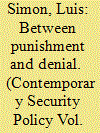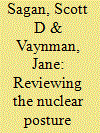| Srl | Item |
| 1 |
ID:
172104


|
|
|
|
|
| Summary/Abstract |
Most debates on U.S. military strategy in the Western Pacific revolve around the question of how to deter China. Advocates of deterrence by punishment believe that the Chinese threat is serious but not critical, because the United States can leverage its global military-technological advantages to preserve a position of regional military primacy. Those in favor of deterrence by denial point to China’s potential and “home advantages,” and argue that the United States should settle for more modest objectives such as preventing Chinese regional military dominance. I argue that the high level of uncertainty around Chinese capabilities and the evolving Sino-American regional military balance have led the United States to adopt a flexible strategy, and embrace distinct–even contradictory–operational concepts to deter Beijing: The United States itself mostly focuses primarily on deterrence by punishment, while actively encouraging and enabling its regional allies to develop deterrence by denial.
|
|
|
|
|
|
|
|
|
|
|
|
|
|
|
|
| 2 |
ID:
102382


|
|
|
|
|
| Publication |
2011.
|
| Summary/Abstract |
The Obama administration has argued that its efforts to reduce the role of nuclear weapons in US defense policy and work toward "a world free of nuclear weapons" will encourage other governments to strengthen the nuclear nonproliferation regime and support global nuclear disarmament. Does the evidence support this assertion? This essay describes the changes in US nuclear weapons and disarmament policies initiated by the Obama administration and outlines four potential pathways through which the United States might influence other governments' policies: by reducing nuclear threat perceptions, by changing global beliefs about what constitutes "responsible" nuclear behavior, by impacting domestic debates about disarmament in foreign capitals, and by creating new diplomatic negotiation dynamics.
|
|
|
|
|
|
|
|
|
|
|
|
|
|
|
|
| 3 |
ID:
166866


|
|
|
|
|
| Summary/Abstract |
The US government initiated a Defense Counterproliferation Initiative to address the concern that, in the post-Cold War years, the proliferation of nuclear, biological, and chemical weapons would be widespread and create a significant challenge to the US military’s combat operations. In particular, non-nuclear states might use chemical or biological warfare agents against US forces with the belief that nuclear weapons would not be used against them in retaliation. Following the events of September 11, 2001, defense strategy and policy shifted to a wider view of the threat of adversarial use of “weapons of mass destruction” (WMD) and the term “counterproliferation” was replaced by “combating” or “countering WMD.” Over time, the Defense Department increasingly moved away from counterproliferation principles with the detrimental effect of losing capabilities that US forces still need for contemporary adversaries. This shift has been aggravated by other US government agencies’ use of “counterproliferation” in lieu of what would have been termed “nonproliferation” activities in the 1990s. The loss of clarity within the US government on these terms has led to the inability to focus the “whole of government” on this significant national security challenge. To alleviate this challenge, the US government needs a top-down initiative to refocus policy on the distinctly different aspects of WMD with respect to military combat operations, combating terrorism, and homeland security.
|
|
|
|
|
|
|
|
|
|
|
|
|
|
|
|